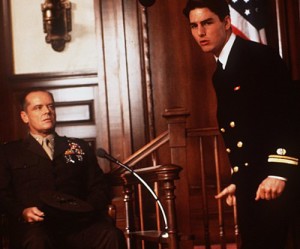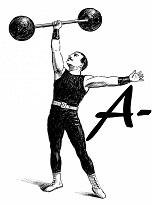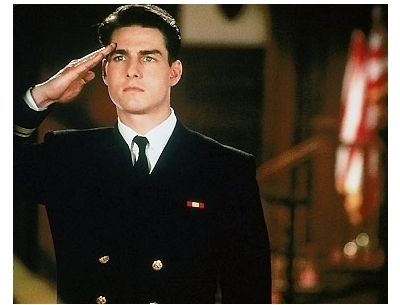My first brush with inconceivably brilliant screenwriting happened in 2010 when I walked out cold and shaken from a screening of “The Social Network.” At that time I was just starting to realize that there exists a higher order of filmmaking and some very talented people have been on it for decades. A year later I watched “Moneyball” and felt that similar overwhelming helplessness; of seeing a writer succeed in clutching me onto his/her world of creation with such ferocity that I couldn’t let go. Research yielded an answer: both of those films were written by someone called Aaron Sorkin.
“A Few Good Men” came to my attention straightaway, because I had looked upon the ability of Jack Nicholson and Tom Cruise before. I watched the film a couple of years ago on TV for the first time and I remember liking it very much. It was until yesterday when I watched it again that I understood what I had missed. “A Few Good Men” is not just a courtroom drama; it is an impeccably scripted film, which avoids dullness like a plague. Sorkin’s script, based on his own play, takes flight early on in the opening minutes and never disappoints for a moment. The dizzying, majestic intelligence of the rapid-fire dialogue is firm and defies categorization. Add to that strong central performances and Rob Reiner’s confident direction and there you have it: a classic, which is hot and fresh even after years of cinematic evolution.
 The plot is about a case of the U.S. government against two U.S. Marines who kill a fellow Marinebecause they were allegedly obeying a command from a higher officer at Guantanamo Bay Naval Base in Cuba. Lt. Kaffee (Cruise), Lt. Commander Galloway (Demi Moore), and Lt. Sam Weinberg (Kevin Pollack) are selected to defend the Marines and they prepare a case. Through the film we wade through the process of them visiting the base and finally seeing their day in court. On the base they run into Colonel Jessup (Jack Nicholson) who, along with his junior officers, makes his best efforts to haul the lawyer trio off the premises in a spectacularly rude fashion. This inspires some doubt in Lt. Kaffee and Galloway and the case of U.S. vs. Dawson and Downey begins its legal proceedings.
The plot is about a case of the U.S. government against two U.S. Marines who kill a fellow Marinebecause they were allegedly obeying a command from a higher officer at Guantanamo Bay Naval Base in Cuba. Lt. Kaffee (Cruise), Lt. Commander Galloway (Demi Moore), and Lt. Sam Weinberg (Kevin Pollack) are selected to defend the Marines and they prepare a case. Through the film we wade through the process of them visiting the base and finally seeing their day in court. On the base they run into Colonel Jessup (Jack Nicholson) who, along with his junior officers, makes his best efforts to haul the lawyer trio off the premises in a spectacularly rude fashion. This inspires some doubt in Lt. Kaffee and Galloway and the case of U.S. vs. Dawson and Downey begins its legal proceedings.
Tom Cruise hits a home run and absolutely nails the nuances of his seemingly inexperienced, baseball-loving lawyer with clarity. Watch him completely lose his mind in an alcoholic monologue, lamenting over losing his career along with the case and try resisting the urge to applaud. Demi Moore counterbalances his character’s lack of seriousness with her well-defined character by performing it with equal capability. Jack Nicholson’s appearances in the film are numbered, but due to the legend that he is, he makes Colonel Jessup the stinkiest bastard you ever saw on screen. His flair of exhibiting a spiteful human being with his obnoxious smile and vicious delivery of lines is a gift. Colonel Jessup goes into my books as one of the most loathsome characters in film history, thanks to Nicholson’s intricate portrayal.
 Rob Reiner holds the rein (forgive the pun) of the film’s pace with dexterity, knowing the strength of the screenplay and playing its elements out in a nerve-wracking way. “A Few Good Men” scarcely lets the audience off the tense job of anticipation. It is easy to be lost about which particular emotion to feel in a single scene while watching the movie, because the film jumps energetically from being sad to inspirational to poignant to hopeless; sometimes all in the same scene. It is solid, and it is mesmerizing.
Rob Reiner holds the rein (forgive the pun) of the film’s pace with dexterity, knowing the strength of the screenplay and playing its elements out in a nerve-wracking way. “A Few Good Men” scarcely lets the audience off the tense job of anticipation. It is easy to be lost about which particular emotion to feel in a single scene while watching the movie, because the film jumps energetically from being sad to inspirational to poignant to hopeless; sometimes all in the same scene. It is solid, and it is mesmerizing.
If there ever was anything like a perfect screenplay, this is it.
– by Yash Bhatia


